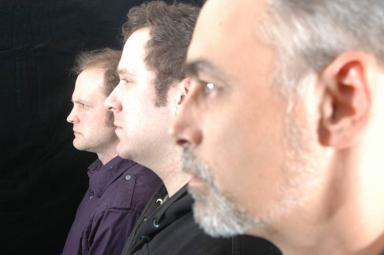Orphans: Growing Up

Why I don’t like Orphans is a little perplexing and therefore worth pursuing. It is a play for three actors on a single set, making it attractive to budget-conscious producers.
It affords each of the actors ample opportunity to plumb emotional and occasionally comic heights and depths, in fact, it is very much an ‘actor’s play’ that should stand or fall on the merits of the acting. I’m not sure that that is enough. Or perhaps it is the style of the play that falls short – I’m not talking about this production by new company WINK Theatre – the actors acquit themselves well (in particular Michael Rinaldi who brings an ADHD exuberance to a part that could easily be portrayed in a withdrawn, autistic, manner that would be much less fun for him and us).
For a while now I have had a hard time with the whole genre of American Naturalism in the theatre. As we the audience become more sophisticated in our understanding of the forms and techniques of narrative, ‘suspension of disbelief’ becomes increasingly elusive. Our sense of cynicism and irony can easily overwhelm the more fragile qualities of belief and imagination that are essential to the success of any performance. My suspicion is that an attempt at naturalism, or realism, places a greater burden on our imagination than a more allegorical or poetic production would. This may seems counter-intuitive; one would think that the easier it was for us to accept a “reality” the better. Our brains though, are incredible mechanisms – they can and do easily accommodate many outlandish propositions, in fact its fun for them. But the one thing the brain seeks is a consistent set of rules that it can apply forward. Should an anomaly occur our brain will create a new set of rules to assimilate the irregularity – and expect things to follow along the path of these new rules. Still, why does that make realism harder on our imagination than a more theatrical representation? And why do we have difficulty accepting anomalies in ‘realism’? Because realism looks like reality, and as a result, we expect it to be real – in a real house the wall doesn’t shake like a thunder sheet when you close the door
Does this mean I’m condemning low-budget productions, or insisting on “fourth wall” proscenium productions? No, and yes. I’m condemning a failure in the artist to provide a context by which the audience can understand the work of art. If you want realism to be the hallmark of your production, then you better deliver on realism; if you want us to view your work through some other lens, then get down to work, figure out what doorway of metaphor or allegory, style or genre, you want to lead us through, and go about creating a complete and coherent reality. There’s a challenge worthy of an artist.
Back to Orphans. When I was asked to review this play I had an immediate nagging response – “I don’t like the play” – but I couldn’t remember why. I thought that perhaps I had changed enough since I had last seen it that a reassessment was in order. It is quite possible that this play speaks to a lost generation of Americans that need “a squeeze on their shoulder” to encourage them to grow up and become adults. There is little doubt that we are currently floundering in an adolescent culture and that the world is suffering from the lack of maturity of the one remaining superpower. Perhaps this immaturity is precipitated by a lack of parenting (cultural and personal) – but really, that seems a sop – a kind of pop-psychology response to a larger crisis. It seems to me that we would be better served by a discussion of responsibility and sacrifice, maybe even compassion for ‘the other’ – actions taken with an idea of a greater good than just our personal development. In the juvenile there is something narcissistic, an impulse that always places its own needs above the needs of the other. Orphans, to me, seems to perpetuate this as an appropriate world-view. It seems to be a play that says our immaturity is not really our fault and that we are not responsible for making ourselves and the world better, for taking responsibility for our own lives. I still don’t like the play, I think its time that we all grew up.



